Cervical Spinal Disc Herniation — Discotomy With Intervertebral Disc Replacement Prosthesis: treatment in the Best Hospitals in the World
Treatment prices are regulated by national law of the corresponding countries, but can also include additional hospital coefficients. In order to receive the individual cost calculation, please send us the request and medical records.
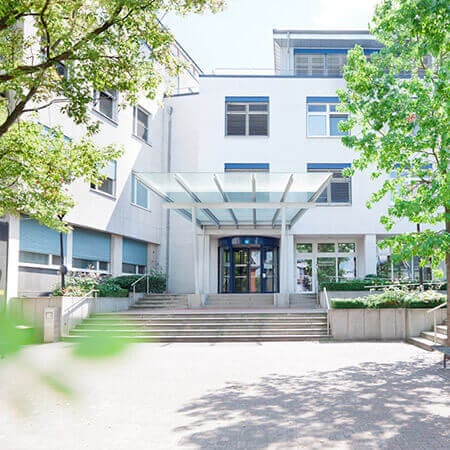
Department of Spinal Surgery
The Department of Spinal Surgery annually treats more than 960 patients with cervical spinal disc herniation. The specialists remove the affected disc with endoscopic equipment and replace it with prosthesis. The surgery involves the use of a three-dimensional O-Arm x-ray system, which provides a complete protection for the spinal cord. The department is headed by Dr. med. A Bitter, who specializes in microsurgical spinal interventions.
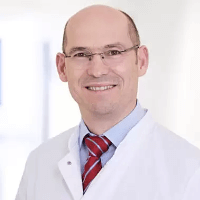
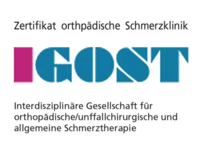
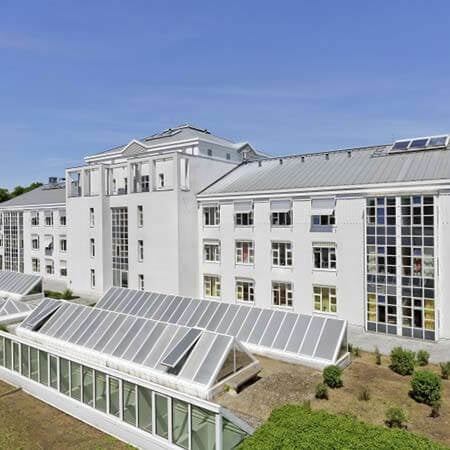
Department of Spinal Surgery
The Department of Spinal Surgery at the Vivantes Auguste-Victoria Hospital all diseases of the spine - both conservatively and operatively. Patients with herniated intervertebral discs, displacement of vertebrae, stenosis of the spinal canal or back pain are treated here. In addition, specialists of the department have a unique experience in the field of complex reconstructive and revision surgeries, which are conducted to continue or correct the previous surgical treatment.
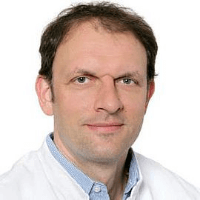
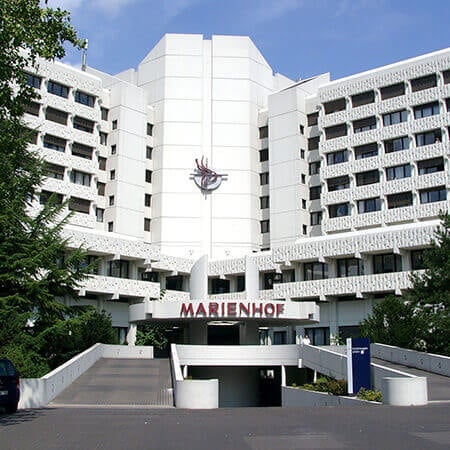
Department of Spinal Surgery
The Department of Spinal Surgery offers the full range of effective treatment methods in the area of its specialization. A highly qualified team of doctors is at the service of the department's patients, who have in their arsenal advanced conservative and surgical treatment methods for pathological changes in the spine. Spinal surgical procedures are performed in modern operating rooms, the technical equipment of which allows spinal surgeons to perfectly perform both major open surgery and sparing interventions: minimally invasive, endoscopic, and microsurgical. Surgical treatment is complemented by a carefully planned course of physiotherapy. This includes procedures such as therapeutic exercises, manual therapy, massage, osteopathic treatment, etc. The department's team of doctors consists of 10 highly qualified specialists who, together with experienced nursing staff, admit more than 1,300 inpatients annually. The medical facility is certified by the German Society for Spine Surgery (DWG) as a level II specialized center. The department's medical team makes every effort to provide each patient with optimal treatment in a pleasant and friendly atmosphere.
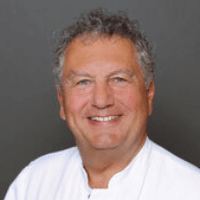
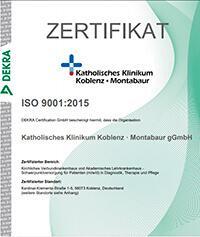
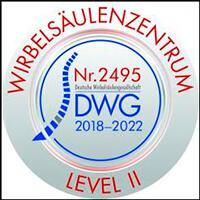
Herniated disc in the cervical spine occurs about 5 times less often than in the lumbar one. It not only affects the quality of life due to pain and impaired sensitivity in the innervation zone of the cervical spinal nerves, but also threatens life, as it increases the risk of ischemic stroke due to compression of the vertebral artery. In the foreign hospitals, hernias can be removed using a minimally invasive endoscopic technique, without long recovery, safely, with a minimum risk of recurrence.
Content
Types of hernias
Herniated disc of the cervical spine is divided into three types, depending on its severity:
- Protrusion is the bulging of the nucleus pulposus without damaging the annulus fibrosus
- Prolapse is a burst of the annulus fibrosus
- Sequestration is a total separation of a fragment of the nucleus pulposus, its extension beyond the disc
According to the localization of the cervical herniated disc, it can be:
- Median (central)
- Lateral
- Foraminal
Symptoms
Symptoms of a cervical herniated disc are caused by the compression of the spinal nerve roots. Stages of the disease are:
- "Soft disc" is an acute phase of the disease caused by protrusion of the nucleus pulposus.
- "Hard disk" is the chronic phase of the disease, in which bone growths appear.
At the "soft disk" stage, patients usually complain of pain in the arms which gets worse after a physical exertion. Headaches and movement disorders are possible in the form of weakness of certain muscle groups.
At the "hard disk" stage the listed symptoms are accompanied by local pain in the hernia area, which is determined during palpation. The onset of paresthesias (unusual sensations) in the area of innervation of the spinal nerves (more often on the hands) is possible. There are also cases of a strong decrease in skin sensitivity. When the roots of the motor nerves are compressed, a sharp decrease in muscle strength (paresis) is observed.
Treatment principles
The hernia is treated conservatively, if possible. It does not disappear physically, but hernia-related symptoms alleviate. Patients take painkillers and anti-inflammatory drugs. The following non-drug treatment methods are often used:
- Physiotherapy
- Exercise therapy
- Reflexology
- Massage
- Orthoses that limit the movement of the neck
Some patients need surgery. It is carried out in the presence of the following indications:
- Symptoms persist for more than 3 weeks without improvement, conservative therapy is ineffective
- Clinical picture of radiculopathy (compression of the spinal nerve roots) corresponds to the level of damage determined by MRI or CT scan
Open surgeries
Open surgical interventions through large incisions have been used in neurosurgery to remove hernias since the 1940s. These treatment methods are still used in countries with poorly developed medicine.
Microdiscectomy is a standard surgery to repair hernias. A hernia is removed through an incision 3-4 cm long. However, this type of surgery has significant disadvantages, as the surgeon has to resect bone structures in order to get to the intervertebral disc. As a result, spinal instability may develop, which will require additional treatment in the future. In addition, microdiscectomy is a traumatic intervention with long postoperative rehabilitation. Therefore, such interventions are rarely carried out in developed countries. Physicians prefer less invasive and safer endoscopic techniques.
Intervertebral disc replacement is the most radical treatment option. The disc is removed totally. An implant is placed instead. Modern disc prostheses are wear-resistant and have long service life. They allow the patient to maintain the full mobility of the spinal column.
Countries with low medicine levels usually perform discectomy without a disc replacement. The vertebral bodies are simply held together motionlessly. As a result, adjacent segments bear increased load and are often damaged, which will require additional operations in the future. After the removal of the disc abroad, it is replaced with a prosthesis, so pathologies of the adjacent segments do not develop.
Endoscopic surgeries
In most cases, herniated discs are treated with minimally invasive procedures and endoscopic interventions. These treatment options are minimally traumatic, have a short rehabilitation period, and do not impair spinal stability. In most cases, there is no need to remove bone tissue during surgery at all, or the volume of resection is minimal.
Endoscopic nucleotomy is excision of a hernia through a puncture in the neck. The surgeon inserts a guide needle first. The procedure is performed under X-ray guidance. The hernia is excised with the help of a nucleotom. It is usually a spiral-shaped rotating probe. The intervention can be supplemented with electrothermal intradiscal therapy, when the physician heats the disc to 90 degrees Celsius in order to destroy the nerve endings, "seal" small fissures in the annulus fibrosus, strengthen it and reduce the risk of hernia recurrence.
Radio wave nucleotomy is the destruction of a fragment of a disc using radio wave energy. The affected disc is divided into parts and removed. At the same time, radio wave nucleoplasty is performed to strengthen the annulus fibrosus and prevent hernia recurrence.
Endoscopic discectomy is the most effective endoscopic surgery, which, unlike the two above mentioned treatment options, can be used even for large hernias. Its efficiency in the best European clinics reaches 98%. The intervention is performed using an endoscope, through a 0,4 mm incision. The instruments are inserted through the natural vertebral openings, so the bone tissue is preserved. Muscles are practically not damaged. Within a few hours after the operation the patient can walk, and the next day he is discharged from the hospital. The rehabilitation period is short, which is especially important for young, physically active people: they can quickly return to physical work or sports.
You can undergo diagnostics and treatment of the cervical spine disc herniation abroad. Please, use the Booking Health service to compare prices in different hospitals and book a medical program at an affordable price.
Authors:
The article was edited by medical experts, board-certified doctors Dr. Vadim Zhiliuk and Dr. Sergey Pashchenko. For the treatment of the conditions referred to in the article, you must consult a doctor; the information in the article is not intended for self-medication!
Sources:

